- Home
- Victor Gischler
Shotgun Opera Page 7
Shotgun Opera Read online
Page 7
Sorry. Ill pick up a six-pack next time Im in town.
Forget it. That polite crap gets old. Whats the matter?
My nephews down there. He pointed at his cabin down the hill.
You dont like him?
I dont know him.
Sounds like a story, Linda said. Come inside. No beer, but I can find something.
Inside, she searched her kitchen cabinets. I have wine.
No wine.
Oh, yeah. Forgot. Theres Beefeater.
Okay. With ice.
She dropped two ice cubes into a juice glass and covered them with gin, handed it to Mike.
Mike sipped, winced. He hadnt touched hard liquor in a long time and never drank gin. But right now he needed something. He forced a gulp. And another. By the third gulp it was easier. Linda topped off his glass.
Howve you been up here? Mike asked. His tongue felt thick. Getting the hang of it?
Its still strange. I have to drive twenty minutes to get milk or bread. I have to go to Tulsa if I want a fresh bagel. I dont scream anymore when a scorpion scuttles across the bathroom floor. She shrugged. But I like the solitude.
Solitude. Mike said the word like he wanted to see how it felt in his mouth. He finished the gin, held out his glass.
Linda poured more gin over the half-melted ice. You okay? Your nephew cant be that bad.
What could Mike tell her? His nephew was this heavy weight hanging around his neck, this thing hed been given to look after. His brothers ghost had sent the boy. He could see Dannys face, that impish, wicked grin. Im calling in the old markers, Mikey. Time to put up or shut up. His solitude was gone, his old life broken. No. That wasnt quite right. The life hed fabricated for himself, Oklahoma, the vineyard, it had all been a cover. An illusion. It was inevitable that the past would come back and demand penance. Andrew was blood whether Mike knew him or not. His brothers blood. Kin, they would say in Oklahoma.
He held the glass toward Linda again. The ice had all melted away.
* * *
The vines were all wrong. Mike walked the rows, but the stakes were too tall, the vines towered over him, closed in on him. It was as if he were in a thick grapevine jungle. He grabbed a bunch, and the grapes burst in his hands, blood seeping like juice over his skin, thick and warm. He tried to wipe his hands on the grape leaves, smearing himself in the vines. It would come off, sticky and hot. It grew hotter, scalding, the blood burning his hands. He screamed, tried to wipe off the blood, the grapevines tangling and he couldnt see or breathe, like the weight of a planet on his chest .
His eyes blinked open to darkness. He sat up, his head pounding, mouth dry. He stood, bumped into something, a table. What was that doing there? He looked around, saw moonlight coming through windows that shouldnt be there.
This wasnt his house. Lindas.
He remembered. The gin. Lindas couch. Hed had too much. Mike shook his head, pain flaring behind his eyes. Embarrassing. He hadnt done that in a long time. He felt bad, needed to apologize to Linda. He thumbed the button on the side of his digital wristwatch, and the tiny light showed him it was 5:07 in the morning. Still dark.
He left through the front door, shut it as quietly as he could behind him. Checked his pockets and found his truck keys. He drove back to his place, the cabin dark. He hadnt meant to leave Andrew for so long.
He went inside, passed the kid on his sofa. Andrew was curled up, still wearing his clothes, but at least hed taken off his shoes. He went into the kitchen, took four aspirin, and drank two full glasses of water. It was too late to go back to bed. He started a pot of coffee. He didnt try to be quiet.
Andrew rolled off the sofa, rubbed his eyes. What time is it?
Morning.
Time to get up?
Only if you want. He talked to the kid over his shoulder, not looking at him. Mike took plain white coffee mugs out of the cabinet over the coffeemaker, set them on the counter. Look, I figure you can just stay here while we think what to do. You didnt tell anyone you were coming here, did you?
Andrew hesitated.
Well?
No. I didnt tell anyone.
Okay then, Mike said. So who would think to look for you here? Nobody. Were in the middle of nowhere. Well just hang out and think things over.
What do you do this early?
I have a cup of coffee, Mike said.
I mean after that. What do you do with your day?
Work the vineyard.
Andrews face wrinkled into a question. Huh. I didnt know they had them here.
They do.
You need any help?
I dont know, Mike said. You know anything about grapes?
No.
You ever prune a vine?
No.
You ever pull weeds?
No.
Well, brace yourself, Mike said. Youre in for a real treat.
12
After killing Vincent Minelli, Nikki Enders had returned to Andrew Foleys drab apartment and waited a full twenty-fours hours before admitting to herself that the boy had bolted. She did not relish the tedious work of digging him out of his hiding place.
And her wrist hurt like hell. Shed swallowed three Aleve, and the thing still throbbed a steady rhythm all the way to the hospital. That greasy oaf Romano had given it a tough twist, aggravating the injury shed received in Italy. The wrist wasnt broken, but the doctor at the emergency room put it in a brace and declared she had a very severe sprain, the worst, in fact, hed ever seen. Everything was swollen and inflamed and generally not how a healthy wrist should be. She was not to lift anything or even hold a pen or a pencil. Then wielding a 9mm machine pistol or tossing a handful of throwing stars is probably out of the question, she thought.
Now she sat in a first-class seat aboard an American Airlines jet to New Orleans, sipping (from a glass in her good hand) a rum and Coke. All of her bright and shiny new guns had been dumped back into the train station locker. The man with the voice would not be happy at the delay, but his happiness was of little concern to Nikki and anyway he could just sweat for a bit and goddammit her wrist hurt and she hadnt slept and she wanted to go home.
But she knew shed have to call him soon. Hed wanted all this handled quickly. Well, it wouldnt be. Not now. Someone had warned Andrew Foley, and now it would take a while. There would need to be phone calls and questions and then in a day or a week or a month someone would catch wind of Foley, and shed be dispatched to finish the job.
But not yet, not at this minute. Right now there was only a rum drink and a comfortable seat and deep, dark sleep.
* * *
The taxi dropped her in front of the old Garden District house, a block removed from the St. Charles streetcar line. She loved coming home to New Orleans, to the old house. Three stories, white columns, impeccable landscaping. There was something old-world about the place. Or maybe it was just like being in an old movie. Old-world charm or just a cheap Gone With the Wind feeling? Either way, she felt vaguely like aristocracy whenever home. Maybe it was the crystal chandelier in the foyer. Somewhere deep in her memory, the little girl in her equated chandelier with aristocracy.
She rang the bell, and a gray-haired black woman answered the door. Welcome home, miss. She stepped aside, allowed Nikki to enter. Do you have anything for the gun cabinet?
Im traveling light, Althea. Hows Mother?
Good days and bad days, miss. The GPS chips we sewed into her clothes help a lot. She sneaked out yesterday and we found her in ten minutes, no problem. Any luggage?
Just this. She indicated the bag slung over her shoulder.
Althea took the bag. Ill put this in your room. Your mother is in the library.
Thank you, Althea.
&n
bsp; Nikki paused under the giant chandelier. It defied gravity up there, looming and glittering like an obscenely expensive sword of Damocles. The sunlight flooded in and danced among the crystal, giving the chandelier the illusion of movement. But it didnt move. It hung there. It had hung there for years. Probably decades of dust up there. Did anyone even look up at the chandelier anymore?
She snapped her attention back from above, went down the long central hall to the library. She stood in the doorway, peeked inside. Her mother sat in the wash of sunlight from the bay window at the far end of the library, but Nikkis gaze was drawn immediately to her fathers portrait over the enormous stone fireplace.
Horace Cornwalls imposing image dominated the library in much the same way the old patriarch had dominated the family when alive. Thick white hair, square jaw, conservative blue suit. Horace had sat for the portrait after hed lost an eye in Panama locking horns with Noriegas goons, so there was a patch over the left eye. On the mantel below the portrait sat a row of keepsakes, framed citations, other awards, and even a sheathed cavalry saber.
Tonya Cornwall was a handsome older woman in her sixties. She was still lean, with raven hair. She sat in a rocking chair near the window, knitting a scarf well over sixty feet long. Shed met Horace while still in the Israeli Secret Service. Hed been a journeyman field operative in the CIA. Their passionate affair had lasted three exciting years before hed knocked her up. Nine months later, she quit the Secret Service, left Israel, moved to Horaces family home in New Orleans, and given birth to Nikki.
Father had finally met his end teaching Afghan rebels to blow up the Taliban with shoulder-launched rockets. Hed been in his tent, eating lamb on a stick, when someone tossed in a grenade.
But in the years before hed been exploded, Horace had taught Nikki much in the ways of death and stealth and global politics. So had her mother, Tonya. Nikki was expert in five different martial arts and competent with any ordnance currently in use by any military in the world. While other kids were playing video games, shed learned to take apart and reassemble an M16 while wearing a blindfold. For her eighth-grade talent show, shed taken volunteers from the audience and knocked apples from their heads by hurling meat cleavers. This was followed by a frantic call from the school principal, who expressed his concern for the lives and limbs of Nikkis classmates.
Now Father was dead, and Mother was not altogether well. After surviving the Cold War and years of dangerous, covert missions, an ordinary robber in the French Quarter had lodged a .22-caliber bullet into an extradelicate portion of Tonya Cornwalls brain. Expensive surgeons had been flown in from Vienna and California, and while Tonya had come out of the surgery alive and in reasonably good physical condition, it was generally understood she would never be quite right again.
Often Nikkis mother would go for days or weeks without any sign of trouble. Then she might suddenly forget where she was or what year it happened to be, and on extreme occasions she might mistake complete strangers for Palestinians and attack them with astounding stealth and speed not usually found in a geriatric woman.
So thats why Nikki approached her mother slowly, without making any sudden moves. She didnt want a knitting needle in the eye.
Hello, Nikki. Her mother didnt look up from her knitting, the needles clicking a steady rhythm. Mother hadnt knitted before her brain injury, but now there was something soothing about the monotony of it. She could sit in the same chair for hours until she ran out of yarn.
What are you making? Nikki asked.
A scarf. Her voice sounded fine to Nikki, smooth and level and not at all crazy. Im not sure about this dark green. I made one for you. A lovely plum color but Ive lost track of it.
Nikki followed the endless scarf with her eyes until she reached a plum stretch about six feet long. Itll turn up.
Your father called from Cuba, she said. Hell be home this weekend.
No he wont, Mother. The Taliban blew him to bits in Afghanistan. Remember?
She smiled indulgently at her daughter, returned to the knitting. Nikki bent over, kissed her on top of the head.
Nikki left her mother in the library, climbed the sweeping staircase up to the second floor, and went into her room. She flopped on the bed, took the phone from the nightstand, and dialed the man with the voice.
Yes? he answered.
Theres been a delay. Nikki explained about Foley.
Do you have any leads? the voice asked.
She pulled her bag into her lap, fished around for the photo. I need you to track down a number.
Tell me.
She read him the phone number from the back of the old photograph. She heard typing. The voice was at his computer. It took him less than ten seconds. A small town in Oklahoma, north of Pawhuska.
What the hells a Pawhuska?
Its on the map, said the voice. Almost to the Kansas state line.
Im going to need two weeks, she said.
Out of the question.
Im injured.
That goes with the territory. Handle the situation as we agreed.
Again, hatred for the voice welled up within Nikki. There was the slightest hint of a threat in his tone. Do the job or else.
Ill do my best, she said.
See to it. He hung up.
She had just gotten home. She would not jump on a plane to Tulsa simply because the man with the voice had snapped his fingers. He did not run Nikki Enders. One day, Im going to find that son of a bitch, then Im going to make him squirm and cry.
In the meantime, she needed to figure her next move. She brought up a map of the United States on her laptop computer, zeroed in on the area west of the Mississippi. The man with the voice said the little shithole town was close to Kansas. That had possibilities. It was maybe time to call in a favor. She dialed the phone and held her breath, hoping she was doing the right thing.
13
Meredith Jacqueline Cornwall-Jenkins was just taking a marble cake out of the oven when the phone rang. Her husband the tax attorney would be home soon, and her plan was to ply him with London broil and asparagus and little red potatoes and a nice pinot noir, then marble cake and French roast coffee; and then, when the man she loved was complacent and a little sleepy, shed again bring up the subject of having a baby. Theyd been married two years. It was time.
But if that was him calling to say hed be late, shed shred him into mulch and put him on the flower beds.
She set the cake on the stovetop and grabbed the phone. Hello?
Hello, Middle Sister. Hows domesticity?
Oh, crap.
Glad to talk to you too, Nikki said.
What do you want? Meredith asked.
I need you to pop over the state line into Oklahoma and kill a man.
I dont do that anymore. Im out.
Nobodys ever really out, Nikki said.
I am. I teach seventh grade. I drive a Volvo, for Christs sake.

 The Shadow Sorceress
The Shadow Sorceress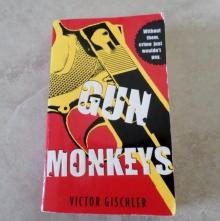 Gun Monkeys
Gun Monkeys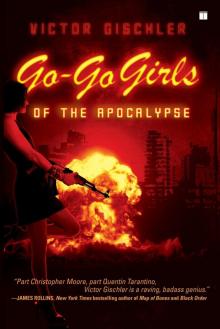 Go-Go Girls of the Apocalypse
Go-Go Girls of the Apocalypse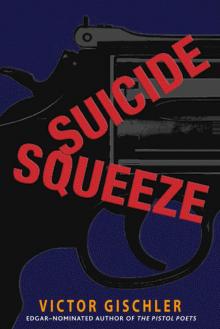 Suicide Squeeze
Suicide Squeeze The Pistol Poets
The Pistol Poets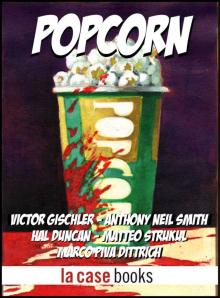 POPCORN
POPCORN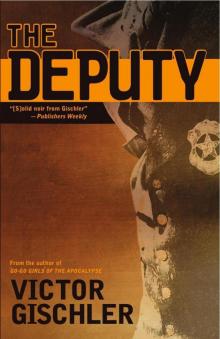 The Deputy
The Deputy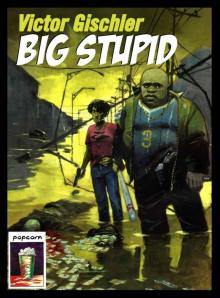 Big Stupid (POPCORN)
Big Stupid (POPCORN) Pistol Poets
Pistol Poets Shotgun Opera
Shotgun Opera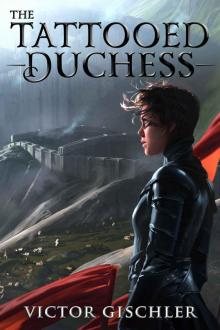 The Tattooed Duchess (A Fire Beneath the Skin Book 2)
The Tattooed Duchess (A Fire Beneath the Skin Book 2)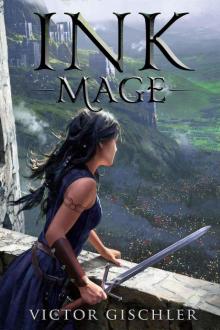 Ink Mage
Ink Mage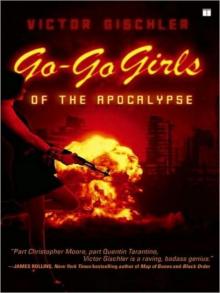 Go-Go Girls of the Apocalypse: A Novel
Go-Go Girls of the Apocalypse: A Novel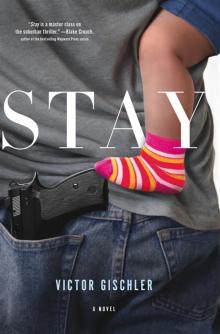 Stay
Stay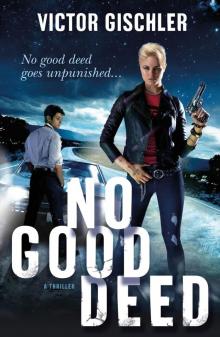 No Good Deed
No Good Deed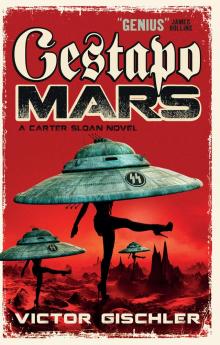 Gestapo Mars
Gestapo Mars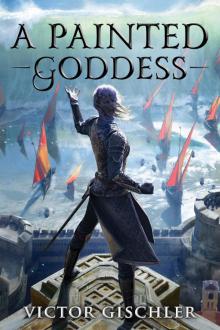 A Painted Goddess
A Painted Goddess